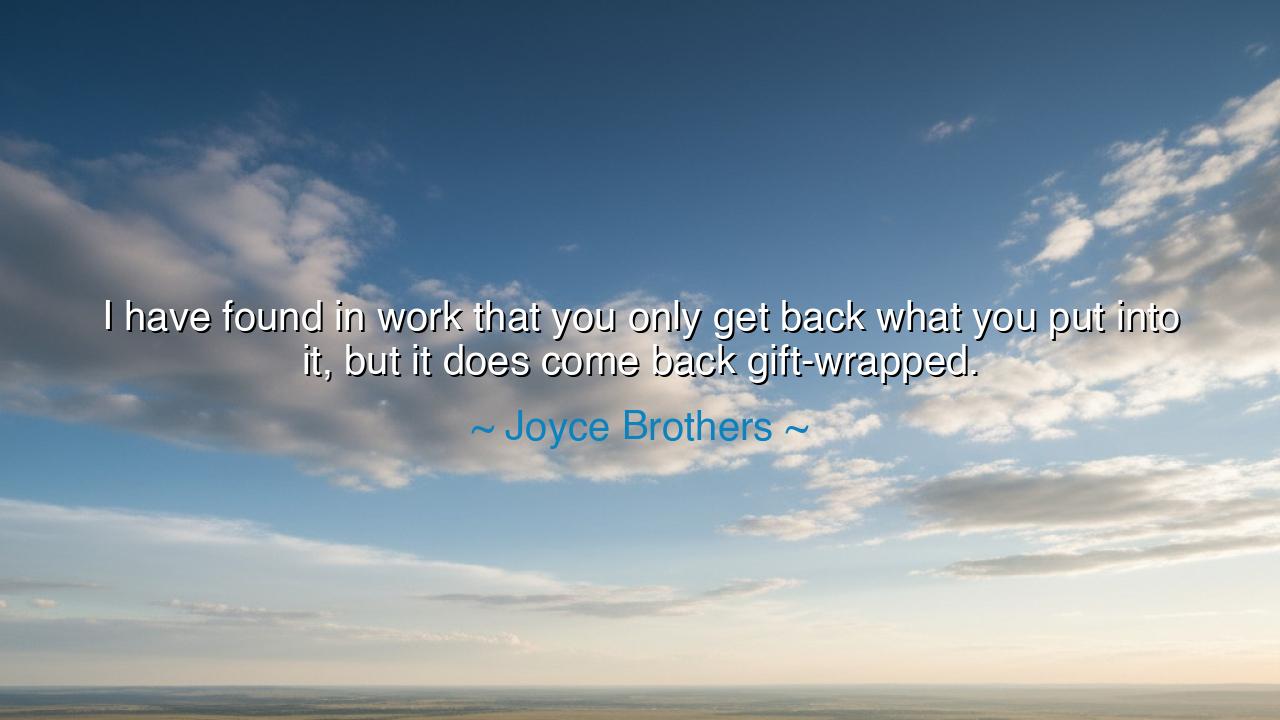
I have found in work that you only get back what you put into
I have found in work that you only get back what you put into it, but it does come back gift-wrapped.






The wise psychologist Joyce Brothers spoke with clarity when she declared: “I have found in work that you only get back what you put into it, but it does come back gift-wrapped.” In her words echoes the law of sowing and reaping, known to the ancients as the eternal rhythm of justice. For in work, no effort is lost, no sacrifice forgotten; the harvest always reflects the seed. Yet she adds a deeper truth—that life, in its mystery, often returns our labor in ways unexpected, adorned with blessings greater than we imagined.
The ancients taught that the earth gives back to the farmer only what he has planted, yet with its own abundance—more grains than seeds, more fruit than blossoms. So too is labor transformed: what begins as sweat and struggle returns as mastery, honor, and reward. The “gift-wrapped” return that Brothers speaks of is this divine embellishment—the surprise of joy, the unforeseen opportunity, the dignity that grows alongside achievement.
To put little into work is to receive little; to put in all one’s strength is to draw forth treasures. Yet the form of these treasures is not always material. Often they appear as resilience, wisdom, self-respect, or the quiet knowledge that one has endured and prevailed. The ancients would call this the favor of the gods, the unseen hand that crowns effort with beauty beyond measure.
Her words also warn against idleness and entitlement. None may expect riches from barren soil, nor greatness from neglected tasks. Only those who labor with devotion find life returning their gifts, wrapped in ribbons of fulfillment. Thus, Brothers reminds us that work is not punishment but participation in life’s great exchange—our strength for its blessings, our perseverance for its rewards.
Let this truth be passed down: whatever you give to your work, life will return, yet multiplied and adorned. Do not fear the toil, for it is the forge of your fortune. Accept that the gift may not come in the form you expect, but when it arrives, it will bear the marks of grace. In this, Joyce Brothers speaks the wisdom of the ancients—that labor faithfully given is never wasted, for it always returns, crowned in mystery, and yes, gift-wrapped by the hand of life itself.






NNNhuong Nguyen
Joyce Brothers’ idea that the return from work comes back ‘gift-wrapped’ is intriguing, but how often do we truly experience that feeling? Is the ‘gift-wrapped’ part simply a metaphor for the hidden rewards we sometimes receive, like personal satisfaction or respect? Or does it suggest that the effort we put into something ultimately brings unexpected, positive results? How do we stay hopeful when the work feels like it’s not yielding the expected returns?
QNQuang Ngoc
This quote makes me think about the importance of persistence. However, I wonder – does every type of work yield a ‘gift-wrapped’ return? Can we be sure that the effort we put into certain kinds of work will always come back to us? And how do we deal with the feeling that our hard work might go unnoticed, or worse, go unrewarded? How can we maintain motivation when the return seems uncertain?
JKJungKook Kim
I like how Joyce Brothers frames work as a process that eventually rewards us, even if it’s not immediately clear. But how do we define ‘what we put into it’? Is it just physical effort, or does it also involve emotional and mental investment? Are some of the gifts we get from our work intangible, such as learning experiences or personal growth? Can the rewards of work be subtle, and how do we learn to recognize them?
VCTa van cong
Joyce Brothers' reflection on work and reward reminds me of how often we feel like we’re giving so much, yet the return seems uncertain. Is it always true that the effort we put in eventually comes back to us, or can there be moments when it feels like we’ve given more than we’ve received? How do we cope with the moments when the return isn’t immediate or as ‘gift-wrapped’ as we expect?
NVnguyen vy
This quote emphasizes the idea that what you put into your work will come back to you, but it might come in ways you don’t expect. Is it possible that this return, while ‘gift-wrapped,’ could be more difficult to recognize? Does it mean that the value of hard work is sometimes hidden beneath surface-level rewards? Can we always trust that our effort will eventually pay off, or are there exceptions?